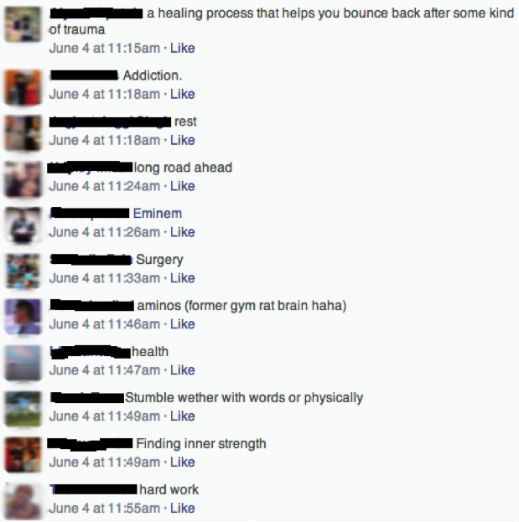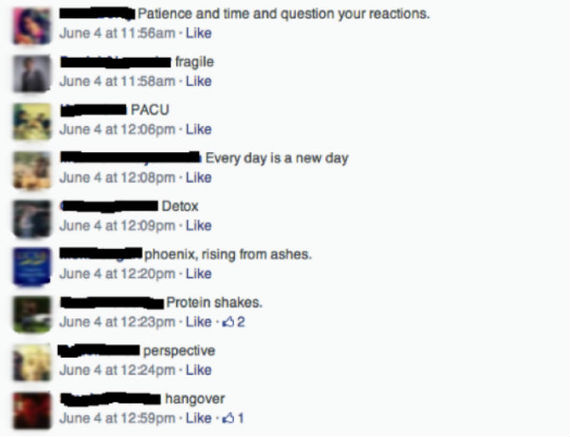
Curious to see how recovery is perceived and experienced by a variety of people, I asked my network on Facebook, "What's the first thing that comes to your mind when you think of the word 'recovery'?"
The results were fascinating and proved that recovery is not bound by a single definition; it's informed by every person's unique experiences.
Last year, I started a job as the creative director of a health and wellness startup targeting those struggling with substance abuse and addiction. The position afforded me the opportunity to attend an open AA meeting that changed my perspective on recovery forever.
I don't know what I was expecting, but the attendees of the meeting were everyday people, most of whom were on a lunch break from their 9-5 jobs. I even recognized a few as internationally famous. But none of that was important in the 60 minutes we shared in that small room connected to a vast church, because all superficial attributes were left at the door. Everyone was connected by their mutual struggle with substance abuse and addiction, and that was all that mattered.
It didn't take long to realize how courageous these individuals were for presenting their raw selves to a group of strangers. How many people are truly comfortable wearing their struggles on their sleeves? I also quickly noticed that the meeting was not centered on the specifics of people's hardships; it was centered on how they transformed their struggles into positive disruptions, progress and success in their lives -- whether it was over a five-year span or a single day.
Upon leaving that meeting, I started thinking about recovery beyond and away from the ideas of addiction and substance abuse.
What was I recovering from in my own life? Aren't we all in some form of recovery?
We all have hardships from our past that can blend into our present. These difficulties can vary from the need to break unhealthy habits, deal with uncontrollable situations, recreate your identity after a devastating breakup, struggle with a bad financial decision or adjust from a big life change.
Recovery takes many forms and has many causes, but the common denominator is realizing the need for change.
I'm currently recovering from the ramifications of a very recent, terrifying health scare. In the weeks between knowing something was wrong and not knowing if it was life-threatening, I was forced to reevaluate my life choices. Was I being who I wanted to be? Was I living the way I wanted to live? Was I truly happy with the choices I was making on the most basic level -- relationships, time management, eating/exercise habits? Was I being authentic and true to my morals, my core and my priorities?
Fortunately, all of the tests came back negative for the illness I feared, but while I was drowning in regrets and loss of hope, I desperately wanted to go back to a time when these weren't issues, when things were "normal," when my life wasn't on the line. But I was reminded of that AA meeting, of those individuals fighting their own battles every day, working hard to make each day better than the last. I was reminded that this is my normal. And I realized it's not about wanting things to go back to the way they used to be; it's about making things better than they have ever been.
There's no shame in admitting suffering, in feeling lost, needing help or being stuck. Recovery's nemesis is struggle, and we have all been visited by her. She never travels alone, and she has plenty of obedient followers -- fear, vulnerability, loneliness, cruelty, disappointment and shame.
The moment you recognize there needs to be a change, your whole life shifts into alignment. And only then, when you perceive your self-aware suffering as something to contend with and not hide from, can you really be in recovery. Otherwise, you aren't in recovery at all. Instead, you are trapped in that revolving door of habit or denial or shame.
Recovery starts with the choice -- the choice to grow and be a better person and live a better life. Then, it becomes a process. There's no end for any of us, and that might sound sad, but I assure you, it is not. It's the most powerful and human ability... to be aware, to choose, to change, to recover (and repeat). It's essentially the will to grow every day. And as we recover, we will fall and have to get back up, and we will hit our milestones -- whether it's a year of sobriety (followed by 10 years); losing that first 10 pounds (followed by being the healthiest you've ever been); making a different, more difficult choice to achieve a healthy financial situation; or not crying for the first time after a heartbreak of some sort (followed by peace, clarity and wisdom).
Recovery is powerful. It's a sign of strength. It's growth. It's human. And most of all, recovery is hope -- hope that each one of us can face our struggles head on and be better, in spite of and despite them.


